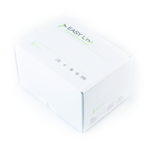| Line | Method & Sample | Product | Package Info |
|---|---|---|---|
| MOLgen | Clinical Specimens | MOLgen Genetics Haemostatic Disease (F2/F5) | Tests per Package: 48 |
| Genetics | Reagent kit is intended for differential determination of single-nucleotide polymorphisms of the coagulation system and folate cycle by real-time PCR with detection of melting curves. The kits contain reagents for real-time PCR only. | Code: ME138020 | Package Format: STR |

For Quantity Orders: Request a Quote
Please pay attention to the revision of the document that must be the same as the revision reported in the box label.
In case of discrepancy please contact our Customer Care e-mail: info@adaltis.net.
* Other document related to the product available at Documentation Centre and it is accessible for Adaltis distributors/partners after registration only.
MOLgen Genetics Haemostatic Disease (F2/F5) reagent kit is intended for differential determination of single-nucleotide polymorphisms of the coagulation system and folate cycle by real-time PCR with detection of melting curves. The kits contain reagents for real-time PCR only.
“Molgen Genetics Haemostatic Disease (F2/F5) Kit” is intended for differential determination of polymorphisms 20210 G/A of F2 gene (coagulation factor II, prothrombin) and 1691 G/A (Leiden mutation) of F5 gene (coagulation factor V, proaccelerin) by real-time polymerase chain reaction (PCR) followed by melting of hybridisation products with a fluorescent tag and detection of melting curves.
The kit is intended for use with block-type PCR cycler CFX96 (Bio-Rad, USA) such as Adaltis AmpliLab.
The assay kit can be applied in clinical practice for a comprehensive study of the genetic factors which increase the risk of disorders in the blood coagulation system.
The extraction of human DNA from clinical samples (buccal epithelium, whole blood) is performed using the kit “MOLgen Universal Extraction Kit”.
The kit is designed for the analysis of 48 samples, including control samples.
The principle of the method is based on the amplification of the selected human DNA region followed by detection of melting curves of hybrid complexes in PCR products and specific probes. The process of amplification consists in repeated cycles: temperature denaturation of DNA matrix, annealing primers with complementary sequences of DNA matrix, and synthesis of a complementary chain from these primers with Taq polymerase.
After the amplification reaction the lowering of temperature results in hybridisation of the specific DNA probe with the amplification product and in decrease of a fluorescent signal in the tube. The release of DNA probe bearing a fluorescent dye is occurred during the temperature melting of formed duplexes. In case of incomplete complementarity of DNA probe and the selected DNA region, the melting temperature of the duplex is lower than that in case of complete complementarity. Thus, the melting temperature of probe duplexes and amplification products is different for two allelic variants of a gene. As a result, the genotype (normal homozygote, heterozygote, mutant homozygote) can be identified for each of the polymorphisms to be determined.
|
Reagent |
Content |
|
Normal homozygote control sample (CS1) |
1 tube, 1.0 mL |
|
Mutant homozygote control sample (CS2) |
1 tube, 1.0 mL |
|
Ready Master Mix for PCR (RMM) (lyophilized) |
48 tubes |
|
Genetics eluting solution (GES) |
2 vials, 12 mL each; |
|
PCR optical-quality film |
1 sheet |
|
Number of tests |
48 |
|
Code |
ME138020 |
Need assistance to make an order? Contact Sales & Orders Centre order@adaltis.net.
For Application Support application@adaltis.net